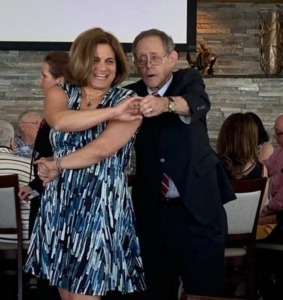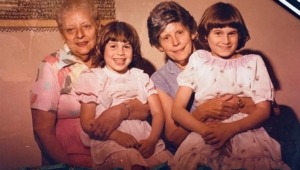 The last time I danced with my Dad was two years ago at my nephew Tyler’s bar mitzvah. I never say no to a dance with him, and I love to watch him on the dance floor with others. Not just because he is a good dancer but because the joy he exudes when he dances is contagious. Seriously, if I could bottle it up and sell it, I’d be a millionaire a few times over.
The last time I danced with my Dad was two years ago at my nephew Tyler’s bar mitzvah. I never say no to a dance with him, and I love to watch him on the dance floor with others. Not just because he is a good dancer but because the joy he exudes when he dances is contagious. Seriously, if I could bottle it up and sell it, I’d be a millionaire a few times over.
He hasn’t let his Parkinson’s diagnosis slow him down. Dancing is a wonderful form of exercise for people with Parkinson’s disease (PD). It helps strengthen muscles and reinforces balance. It also stimulates the mind and keeps depression at bay which is common among those with PD.
It’s also a lot of fun.
I’m hoping for many more dances with Dad, so I’m taking six minutes today to shine a light on PD. April is Parkinson’s Awareness Month, and someone is diagnosed with it every six minutes in the U.S. Parkinson’s disease is the second most common neurological disease after Alzheimer’s disease. More than 10 million people worldwide live with Parkinson’s—including my Dad. He was officially diagnosed in 2011 but probably lived with it for years before that. The cause is largely unknown, but research points to a combination of genetics and environmental causes, like pesticides. Coincidentally, there are at least four other people who worked in the same building as my Dad who has or had Parkinson’s, so environmental causes could very well be a factor in his case.
PD is a complex disease to diagnose because many of the symptoms are similar to what happens as we age—walking slowly and shuffling, losing balance, cognitive difficulties, limb stiffness, tremors, and so on. But PD affects dopamine-producing neurons in a specific section of the brain. Dopamine is associated with movement, attention, memory, and learning, and low levels cause various issues. People are typically diagnosed later in life, but early onset is also possible. There are treatments—medication, physical therapy, etc. but so far, no cure.
Research is crucial to finding a cure. I am currently enrolled in the Parkinson’s Progression Markers Initiative, a comprehensive research study funded by the Michael J. Fox Foundation for Parkinson’s Research. I’m also considering genetic testing to see if I have one of the three genes that indicate a higher risk factor for Parkinson’s. It turns out that I have family members on both sides who have been diagnosed with PD, but having the gene doesn’t mean I will ever develop the disease.
Getting off of my soapbox and back to my Dad. He is doing well. He has a terrific support system of friends and family and loves to keep in touch with everyone. And while I see changes in him as the years go by, I know there is still a lot of dancing left for us to do.
If you have a loved one, who has been diagnosed with PD or just want to learn more about this progressive neurological disease, check out the #Take6forPD campaign.

 They say that you never forget your first kiss, first trip to Disney World, first car, and many other firsts.
They say that you never forget your first kiss, first trip to Disney World, first car, and many other firsts.